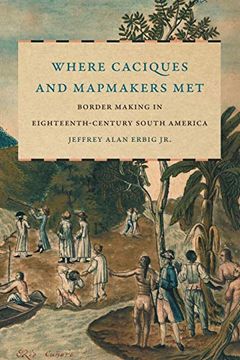Share
Where Caciques and Mapmakers Met: Border Making in Eighteenth-Century South America (The David j. Weber Series in the new Borderlands History) (in English)
Jeffrey Alan Erbig (Author)
·
Univ Of North Carolina Pr
· Paperback
Where Caciques and Mapmakers Met: Border Making in Eighteenth-Century South America (The David j. Weber Series in the new Borderlands History) (in English) - Jeffrey Alan Erbig
$ 33.12
$ 34.95
You save: $ 1.83
Choose the list to add your product or create one New List
✓ Product added successfully to the Wishlist.
Go to My WishlistsIt will be shipped from our warehouse between
Monday, June 10 and
Tuesday, June 11.
You will receive it anywhere in United States between 1 and 3 business days after shipment.
Synopsis "Where Caciques and Mapmakers Met: Border Making in Eighteenth-Century South America (The David j. Weber Series in the new Borderlands History) (in English)"
During the late eighteenth century, Portugal and Spain sent joint mapping expeditions to draw a nearly 10,000-mile border between Brazil and Spanish South America. These boundary commissions were the largest ever sent to the Americas and coincided with broader imperial reforms enacted throughout the hemisphere. Where Caciques and Mapmakers Met considers what these efforts meant to Indigenous peoples whose lands the border crossed. Moving beyond common frameworks that assess mapped borders strictly via colonial law or Native sovereignty, it examines the interplay between imperial and Indigenous spatial imaginaries. What results is an intricate spatial history of border making in southeastern South America (present-day Argentina, Brazil, and Uruguay) with global implications. Drawing upon manuscripts from over two dozen archives in seven countries, Jeffrey Alan Erbig Jr. traces on-the-ground interactions between Ibero-American colonists, Jesuit and Guarani mission-dwellers, and autonomous Indigenous peoples as they responded to ever-changing notions of territorial possession. It reveals that Native agents shaped when and where the border was drawn, and fused it to their own territorial claims. While mapmakers' assertions of Indigenous disappearance or subjugation shaped historiographical imaginations thereafter, Erbig reveals that the formation of a border was contingent upon Native engagement and authority.
- 0% (0)
- 0% (0)
- 0% (0)
- 0% (0)
- 0% (0)
All books in our catalog are Original.
The book is written in English.
The binding of this edition is Paperback.
✓ Producto agregado correctamente al carro, Ir a Pagar.

